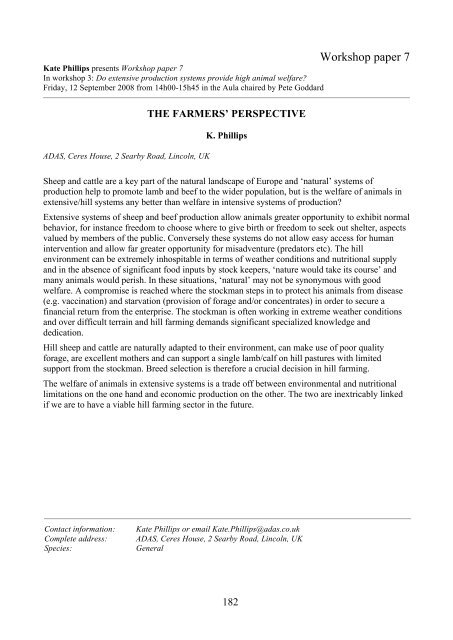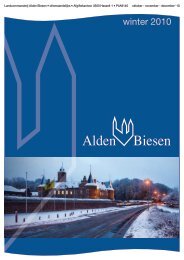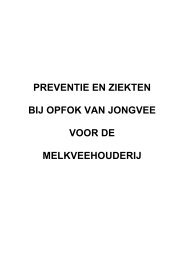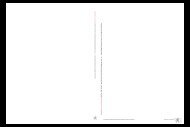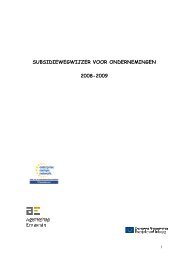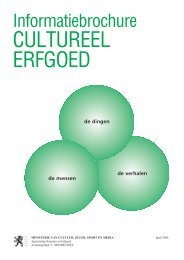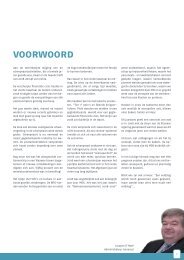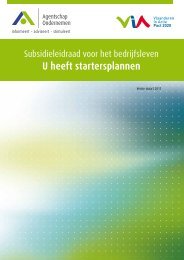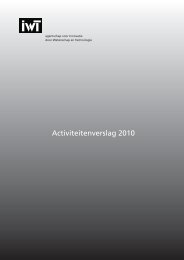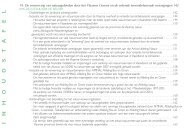Acknowledgements Book of abstracts - Publicaties - Vlaanderen.be
Acknowledgements Book of abstracts - Publicaties - Vlaanderen.be
Acknowledgements Book of abstracts - Publicaties - Vlaanderen.be
Create successful ePaper yourself
Turn your PDF publications into a flip-book with our unique Google optimized e-Paper software.
Kate Phillips presents Workshop paper 7<br />
In workshop 3: Do extensive production systems provide high animal welfare?<br />
Friday, 12 Septem<strong>be</strong>r 2008 from 14h00-15h45 in the Aula chaired by Pete Goddard<br />
ADAS, Ceres House, 2 Searby Road, Lincoln, UK<br />
THE FARMERS’ PERSPECTIVE<br />
K. Phillips<br />
182<br />
Workshop paper 7<br />
Sheep and cattle are a key part <strong>of</strong> the natural landscape <strong>of</strong> Europe and ‘natural’ systems <strong>of</strong><br />
production help to promote lamb and <strong>be</strong>ef to the wider population, but is the welfare <strong>of</strong> animals in<br />
extensive/hill systems any <strong>be</strong>tter than welfare in intensive systems <strong>of</strong> production?<br />
Extensive systems <strong>of</strong> sheep and <strong>be</strong>ef production allow animals greater opportunity to exhibit normal<br />
<strong>be</strong>havior, for instance freedom to choose where to give birth or freedom to seek out shelter, aspects<br />
valued by mem<strong>be</strong>rs <strong>of</strong> the public. Conversely these systems do not allow easy access for human<br />
intervention and allow far greater opportunity for misadventure (predators etc). The hill<br />
environment can <strong>be</strong> extremely inhospitable in terms <strong>of</strong> weather conditions and nutritional supply<br />
and in the absence <strong>of</strong> significant food inputs by stock keepers, ‘nature would take its course’ and<br />
many animals would perish. In these situations, ‘natural’ may not <strong>be</strong> synonymous with good<br />
welfare. A compromise is reached where the stockman steps in to protect his animals from disease<br />
(e.g. vaccination) and starvation (provision <strong>of</strong> forage and/or concentrates) in order to secure a<br />
financial return from the enterprise. The stockman is <strong>of</strong>ten working in extreme weather conditions<br />
and over difficult terrain and hill farming demands significant specialized knowledge and<br />
dedication.<br />
Hill sheep and cattle are naturally adapted to their environment, can make use <strong>of</strong> poor quality<br />
forage, are excellent mothers and can support a single lamb/calf on hill pastures with limited<br />
support from the stockman. Breed selection is therefore a crucial decision in hill farming.<br />
The welfare <strong>of</strong> animals in extensive systems is a trade <strong>of</strong>f <strong>be</strong>tween environmental and nutritional<br />
limitations on the one hand and economic production on the other. The two are inextricably linked<br />
if we are to have a viable hill farming sector in the future.<br />
Contact information: Kate Phillips or email Kate.Phillips@adas.co.uk<br />
Complete address: ADAS, Ceres House, 2 Searby Road, Lincoln, UK<br />
Species: General


